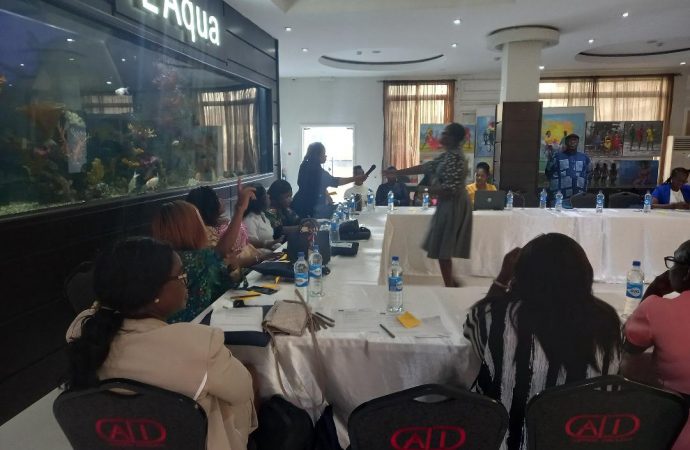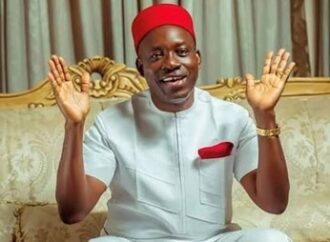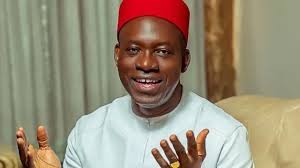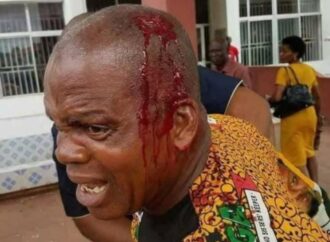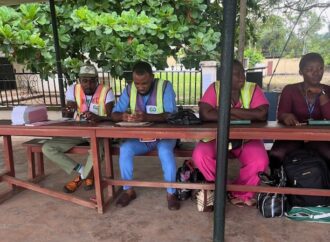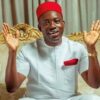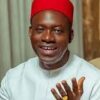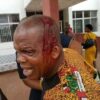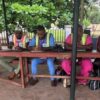The popular expression that “women rule the world” may not be widely embraced in Nigeria due to several factors including religious and cultural. Conversations are often about underrepresentation and lack of inclusivity for women in the electoral process; with declining numbers of women holding important political positions, a lot of people, including female journalists are
The popular expression that “women rule the world” may not be widely embraced in Nigeria due to several factors including religious and cultural. Conversations are often about underrepresentation and lack of inclusivity for women in the electoral process; with declining numbers of women holding important political positions, a lot of people, including female journalists are genuinely worried and are seeking multifarious ways of redressing this gender disparity.
To bridge the gap in participation by the marginalised groups which include women, youths, and Persons with Disabilities (PWDs), a group of female seasoned journalists has resolved to contribute their quota towards enhancing the visibility given to women in the media, thereby helping to contribute towards giving them exposure and positioning them for leadership positions both elective and appointive.
Women in leadership positions in Nigeria have generally not been found wanting where they have been given the opportunity and have been tested and tried. They have indeed been well acknowledged and often applauded for their good deeds and excellent performance. The huge population of women in Nigeria is an important factor that should, therefore, recommend more women for leadership positions but that is not yet the case. Figures from the World Bank development indicator shows that 49.32% of Nigeria’s population is made up of women. By implication, Nigerian women are numerically almost a hundred million of the 200 million of the country’s population.
The impressive numbers notwithstanding, only a few of them are able to access positions of leadership in the political realms. This is indeed an irony as politics is supposed to be a game of numbers. But that is far from being translated into reality in Nigeria’s political ecosystem. In other professional and academic spheres women excel and pull their weight and in some cases dominate the terrains. But data analysis by the Global Gender Gap Index of the World Economic Forum (WEF), ranks Nigeria mere 139th position out of 153 countries. Recent data also reveals that only 5.8% of the current parliamentarians are women, while 10.3% of the ministerial cabinet in Nigeria are women. Allison 2022, Gender Gap Index placed less advanced than the previous data of 2006, ranking Nigeria 141st country on the global position of countries that allow women political empowerment.
In addition, an analysis of the list of candidates by gender in the recent data released by INEC reinforces this disparity. Out of the 1,110 senatorial seats to be contested for nationally in 2023, only 92 of them or 8.4 per cent are women. In the same vein, of the 3,114 House of Representatives candidates nationally, only 286 or 9.2 per cent are women. The figures, without prejudice, indicates that Nigeria is far from bridging the gap of gender disparity in its leadership construct when compared to the previous elections in 2019. Statistics for 2019 elections reveal that out of twenty-three thousand, four hundred and forty-two (23,442) candidates that contested in the polls, three thousand thirty-two (3,032) candidates were women, representing 12.9%.
With the seemingly discouraging statistics on women’s participation in Nigeria’s Political space, female journalists across Nigeria have resolved to contribute towards correcting gender disparity in Nigeria’s political and general leadership landscape. Some of the female journalists that participated in a 2-day training programme organized by the International Press Centre (IPC), supported by the EU-SDGN 11, project under component 4 which aims at strengthening the media, highlighted some of the challenges women face in different spheres and how prejudiced perception makes the society to sometimes discriminate against them.
Some of them also noted that for the media to correct the disparity, it must start from the internal structure of the media houses. Like the popular proverb of physician heal thyself, some of the female journalists posit that charity must begin at home. They explained how women in the media should be empowered to strategic positions where they can influence decision making and be able to enhance the visibility of women participation in the coming elections and subsequently.
It Starts from the Newsrooms
Tomi Falade, Life editor of the Independent newspaper, Lagos pointed out that the whole process begins with the newsrooms. She explained that segregation begins in the newsroom where there should be a balance of personnel, and once that is overcome, every journalist should encourage women’s representation in leadership from the media to the larger society.
“Very rarely will you see a female political editor, I was at a meeting of political editors recently, and at least 90 or 95 per cent of them were men. There is rarely a woman because they believe that politics is big business and you need energy but what people don’t realise is that you don’t necessarily need physical energy to do the work of journalism you just need the brain and being a man does not make you smarter than a woman, it just means you have a business anatomy than a woman. You don’t need brute force to report politics.
“And it is the same problem we are having in governance where women are not represented because people feel that to lead people you must be a man, you must have power, you don’t need physical strength to do these things, you just have to be smart. So that mistake we are making is creating a gender imbalance in the newsroom. In an old-school newsroom, you rarely find women other than the typists and those reporting lifestyle, fashion women are relegated to those beats they consider unimportant. But strong beats like business, politics, and sometimes even sports you don’t find women.
“I think society is just afraid that if you give women an inch, they may take a yard. I think the populace of leading people is just afraid, because how do you explain not passing the 35 per cent inclusion bill? That bill was taken out, and 35 percent is not even 50 percent. And you expect these women would come back and vote for you and do all sorts of all? How do you weigh in a balanced society when a major part of the society is not represented?
‘I feel journalists are supposed to sensitise and educate the public, that responsibility shouldn’t fall on female journalists alone. That’s our job as journalists, educate the public and let them know what to do”, she said.
Susan Serkara Nwikhana, the Rivers state chairperson of the Nigeria Association of Women Journalists (NAWOJ), added that for female journalists to enhance visibility of women representation, there must be gender balance in the newsrooms. She also advised that once that is fixed, journalists would be able to speak for affirmative action which will include women in the leadership role. Her words: “I work for the Tide newspaper, most times my bosses don’t see females going out during the elections, but when I got to the newsroom, I told them I was ready for INEC election coverage and was ready to do the work. You don’t have to segregate but it happens in many media houses. Most female journalists have complained that their editors don’t allow them to go cover election beat, they say it is meant for the men.
“It is our duty to speak for the 35% affirmative, which means give us what we can do. There should not be segregation again nor should there be gender bias”, she said.
Professionalism, Key to Enhance Women’s Visibility in the Media
To achieve constructive reports towards repositioning the country for inclusion and women participation in leadership positions, some of the female journalists agreed that they must exhibit a high level of professionalism. Mrs Motunrayo Joel, the deputy editor of the Africa Check urged female journalists to be the voice of the voiceless. And they must possess a high level of media literacy, which will assist them in factual reporting happenings to women in society.
She also encouraged all female journalists to produce groundbreaking stories for sensitisation.
“Voter education is an excellent medium for female journalists to promote participation in Nigeria’s general election process. For any election to be democratic, voters must understand their rights and responsibilities. Hence, now is the time for female journalists to produce groundbreaking stories on voter and civic education. But these stories must be factual and accurate. They must also be gender-sensitive and relevant to women.”
Miss Blessing Ezeja, a reporter at Eagle, online advocated that enhancement of female participation in politics could happen by giving the same media attention and space to all candidates irrespective of gender. “Ensure balanced reportage of electoral processes, give coverage to the participation of the vulnerable (the aged, physically challenged) in the society in the elections”, she said.
Ms Nneoma Ahuaana, Imo state Government House correspondent, statesman newspaper, also urged female journalists to uplift professionalism and integrity to create a balanced environment for the enhancement of women in the society.

